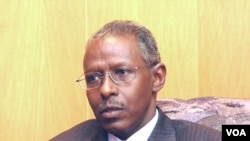This is Part One of a five-part series on Eritrea Today
Continue to Parts: 1 / 2 / 3 / 4 / 5
A political advisor to Eritrea President Isaias Afewerki says the country has reactivated its membership in the Intergovernmental Authority on Development (IGAD), an East African sub-regional bloc.
Yemane Gebreab, who is also head of political affairs at the People's Front for Democracy and Justice (PFDJ), said Eritrea suspended its membership from the group in protest after the sovereignty of a member state of was “violated.”
He said Asmara was disappointed after IGAD failed to uphold a U.N. Security Council resolution, which called for the respect of the territorial integrity and sovereignty of Somalia.
He explained that Eritrea suspended its membership after Ethiopia “invaded” Somalia. Ethiopia sent troops into Somalia in 2006 in support of the country’s Transitional Federal Government. It was fighting Islamists, including the Islamic Courts Union, a group of Sharia Courts that controlled much of southern Somalia at the time.
Ethiopia’s Prime Minister Meles Zenawi said his country’s borders were threatened by rebel forces within Somalia, and that the TFG had invited Ethiopian troops to enter.
“We felt that the rights of one member state, Somalia, was ignored by our sub-regional organization,” said Gebreab, “when the Ethiopian invasion came in 2006… IGAD gave its blessing to the violation of Somalia’s integrity and sovereignty, and Eritrea felt that that was not acceptable,” said Gebreab.
“The situation has not changed since [we suspended our membership] then but we felt that we had made our point, and resuming our activities in IGAD will help a more constructive approach by IGAD in the regional organizations.”
Gebreab called on IGAD to shift its focus from conflict management and resolution to fostering strong bilateral relations among member states for development, which he said will significantly improve the lives of citizens in the Horn of Africa.
“While that is important, we feel the focus needs to be on regional integration. We are key proponents of the idea that we need to improve infrastructure in Africa,” said Gebreab.
“Everyone knows that it is easier to go a neighboring African country via Europe, and everyone knows that that needs to end. We feel in our sub-region we need to develop railway links [and] road links between our countries….This needs to be the focus of IGAD.”
Despite its enormous potential and natural resources, the Horn of African has often been plagued with drought and sometimes famine.
Last year, the Horn experienced its worst drought in six decades. The United Nations said more than 12 million people in the region needed urgent food aid.
Gebreab described the situation as unfortunate.
“The Horn of Africa is a very rich part of the continent, [and] we should not be suffering drought, our people should not be dying from lack of food or famine in the 21st century with all the resources we have,” he said.
Gebreab expressed hope about the prospects of the region despite what he said were decades of opportunity lost to conflict.
“We are going to come out of this period of our history, and I think that you will see the Horn of Africa emerge as a very active dynamic part of the continent… It will provide a boost to the continent as a whole,” Gebreab said.
Gebreab said Asmara will continue to work with members of IGAD to strengthen relations and bolster security in the region.






